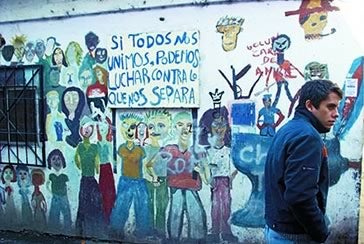Four HLS students found themselves sitting across a table from Carlos Menem, president of Argentina from 1989 to 1999. It was their opportunity, said Ariella Shkolnik ’09, “to ask poignant, difficult questions” about his controversial administration, widely accused of corruption and indifference to human rights abuses.
If the students were looking to Menem for contrition or regret, they saw none. “He was able to both dodge and reshape our questions so as to support his own beliefs,” said Stephanie Early ’09. “He was unwavering in his support of his own decisions.” Matthew Wells ’09 added: “He is the quintessential politician. Although I may not agree with him on anything, the man is, essentially, Argentina of the 1990s. The opportunity to sit down and talk with him in such an informal setting was incredible.”
The four students were participating in the HLS Human Rights Program’s pilot summer seminar in Buenos Aires, led by Clinical Professor James Cavallaro. Over the course of the summer they worked separately for various human rights NGOs but gathered weekly with six Argentine law students for a seminar at the University of Palermo. Co-taught by Cavallaro and Palermo Professor Maria Eva Miljiker LL.M. ’03, the seminar focused on human rights litigation in Argentina.
Buenos Aires proved an ideal setting for the seminar, Cavallaro explains, partly because of the human rights violations in Argentina’s recent history—especially the “dirty war” of the 1970s and 1980s during which thousands of people who voiced disagreement with official policies disappeared. “We chose Argentina because of the sophistication of the legal system, the quality of the universities, the relevance of human rights to the country, and the breadth and excellence of human rights organizations in Buenos Aires,” he said.
Wells, investigating discrimination against Bolivian immigrants, visited barrios and interviewed residents. He was even invited to attend a weekly grassroots meeting of leaders of the immigrant community. “It was incredible to listen and learn from them, to see their passion,” he said.
Rozanne Neil ’09 focused on increasing the public’s awareness of legal aid options. She visited every legal aid center in Buenos Aires. The interviews she conducted culminated in the publication of a legal aid guide that will be distributed to the public in marginalized areas.
Shkolnik worked in a large, 80-person NGO to improve access to the justice system for all Argentine citizens. Initially, she says, she wasn’t sure how well she would fit in, but she was delighted when the executive director included her in an informal, “town-hall” meeting at which employees were encouraged to ask questions and share opinions. “The meeting created an atmosphere of collectivity,” Shkolnik said. “It really made me feel like I was working for a greater good.”
Early interned with an NGO that helped to bring human rights cases in front of domestic courts and the Inter-American Commission and Court. She designed a project to examine how the Argentine courts might be restructured to better enforce their sentencing decisions.
The students reported that some of their most valuable interactions occurred in the weekly seminars, where they met with key figures in some of Argentina’s most important human rights cases. “The presentations weren’t ‘Should you have done this?’” said Cavallaro. “It was ‘Should you do this tomorrow at your hearing?’ and ‘Should you call a press conference next week?’ It was a live, engaging experience.”
Among the cases they studied was a lawsuit trying to get the city of Buenos Aires to provide adequate schools for its underprivileged children, some of whom had been attending classes in metal shipping containers without heat or air conditioning. The HLS group visited some of the schools to observe conditions and talk with teachers and pupils. Another case involved the train system of Buenos Aires, which charges higher fares and uses subpar trains on the line that runs to the poorer areas of the city.
“The field trips made this seminar stand out,” said Joaquín Millón, one of the Palermo law students. “Examining the real-world context of each case … caused us to reflect in a new way on the ability of litigation strategies to effect real progress.”
The students also benefited from meetings with important politicians and jurists, including Menem, former President Raul Alfonsin and Ricardo Luis Lorenzetti, president of Argentina’s Supreme Court. The meetings were arranged by Cavallaro and Miljiker, with assistance from several staff members at Yale Law School, who were involved with Yale’s own human rights program in Argentina.
In addition to setting up an ongoing partnership with the University of Palermo, Cavallaro hopes to start similar programs in Thailand, India and sub-Saharan Africa. “It’s a globalized world, and not all legal education will occur in Cambridge,” he said. “This is the internationalization of Harvard Law School.”
